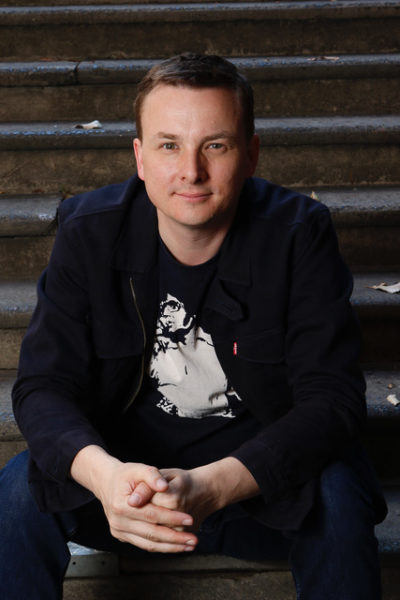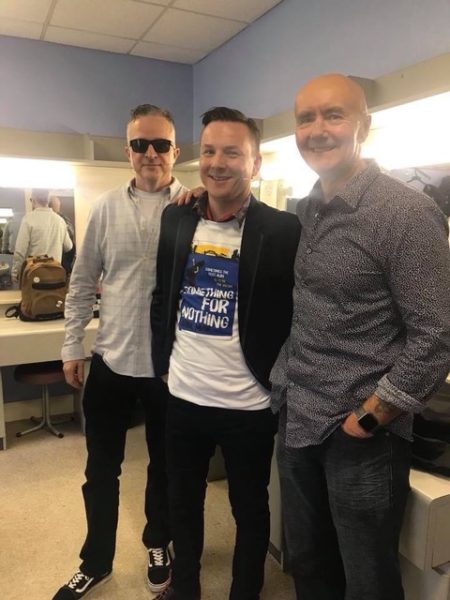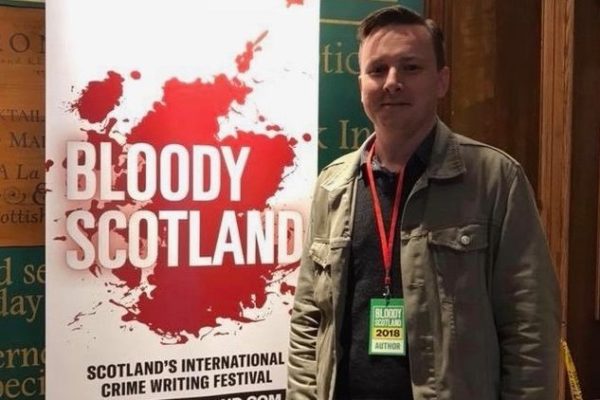Each month we shine a spotlight on a member of our community to learn more about their writing journey, achievements, and inspirations. This month we are featuring Andy Muir, a television screenwriter turned crime novelist whose 2017 debut Something for Nothing earned him a nomination for the Ned Kelly Award for Best Debut Fiction.
 With credits on a range of television series, Andy fell for crime while working on the writing team for the hit franchise Underbelly. Nominated for an Australian Writers Guild Award for Underbelly Squizzy, he also adapted that TV series into a novel. He is currently working on Hiding to Nothing, the follow-up to Something for Nothing, which will be released next year. Andy spoke to our Membership Intern, Alexander Wells, about inspiration, his love for Newcastle, and his experience bringing his unique style of ‘thong noir’ to the Bloody Scotland international crime writing festival.
With credits on a range of television series, Andy fell for crime while working on the writing team for the hit franchise Underbelly. Nominated for an Australian Writers Guild Award for Underbelly Squizzy, he also adapted that TV series into a novel. He is currently working on Hiding to Nothing, the follow-up to Something for Nothing, which will be released next year. Andy spoke to our Membership Intern, Alexander Wells, about inspiration, his love for Newcastle, and his experience bringing his unique style of ‘thong noir’ to the Bloody Scotland international crime writing festival.
Congratulations on the success of your debut novel, Something for Nothing, which was published last year to wide acclaim and was nominated for the Ned Kelly awards. Tell us a little bit about the story.
Something for Nothing is about Newcastle house painter Lachie Munro. Lachie is paying off a gambling debt by poaching abalone when he finds a large shipment of drugs floating in the ocean. He decides selling this will solve all of his problems. It’s a funny caper, which makes it a little bit different to a lot of other crime fiction out there, and it is told from the point of view of the person being investigated.
Working on the TV series Underbelly taught me there are two sorts of crooks – the professionals, who come from a family line and have done their apprenticeship in the trade; and the second lot, the people who make a poor decision and end up way over their heads very quickly. Lachie suffers from both.
I got quite annoyed when a reviewer referred to Lachie as a lovable loser. He’s no loser. He’s just someone not living to their best potential – we all know people like that. When you dig down, that’s what the book is really about: someone whose own poor decisions have backed them into a corner that has left them with no options.
What was your inspiration for the book? (We won’t believe you actually found a shipload of heroin while fishing off Port Stephens…)
In a lot of ways, the book came about for two reasons. First, I was frustrated with the lack of opportunities I was getting in television and I needed to write something with no expectations, just to see where it would lead. The second was that I was also sick of reading stories, both novels and TV shows, where violence against women was a key plot point, either as the inciting incident or as an act break. I wanted to write a story that was fun like older novels from Elmore Leonard, Donald E. Westlake, Janet Evanovich … and judging from feedback, my readers agree.
But in terms of story inspiration, that is much harder to pin-point. I worked for a short time as a house painter when the television work was going through a dry spell. That gave me a lot of material. Except, no one I worked with was a crook.
 The drug storyline came about from the Pong Su, a container vessel that dropped a shipment of drugs off in Victoria only to then be chased up the coast by the law. That plan was so weirdly inept; it still makes no sense. Thinking about that – chewing over all of the what ifs that writers spend a lot of time thinking about – conjured the scenario.
The drug storyline came about from the Pong Su, a container vessel that dropped a shipment of drugs off in Victoria only to then be chased up the coast by the law. That plan was so weirdly inept; it still makes no sense. Thinking about that – chewing over all of the what ifs that writers spend a lot of time thinking about – conjured the scenario.
But if I go back into my files, years ago I had written an outline for a novel with a couple of odd chapters involving a guy trying to sell illegal abalone in St. Kilda, down in Victoria. No idea where that came from. Ultimately, writing a narrative has always been asking myself a string of what happens next? or but then… type questions.
The book is mainly set in the Hunter, and features great Newcastle institutions such as Nobby’s Beach, the Great Northern, the Stockton ferry. What made you want to use these places in a crime novel?
That weird outline I mentioned dated from 2009, and fed the silverfish in the drawer until I went to the Newcastle Writers Festival in 2013 with Underbelly Squizzy. I fell in love with Newcastle as a location and, remembering that kernel of a story, I thought it would work much better there. Transplanting it from Victoria was very straightforward and so easy that it was clearly meant to be.
Working in TV, I am always looking for a new location, storyline, or character – something I haven’t seen before. Newcastle was exactly that. It felt new and unique.
I’ve had readers tell me that they have gone to Newcastle after reading the book. Even heard from locals that they think they know who the characters and what some of the places actually are. They’re wrong. It is all from my own imaginings. Especially Billy Wong’s Chinese restaurant.
But to capture the city, I made a number of trips up there, walking the streets and hanging out. I’m a big believer in walking locations. I’ve done it with every TV series I’ve worked on. It gives you a real sense of the place and the people. Google Street View only gets you so far.
Your protagonist, Lachie Munro, narrates the novel in a style that is smart, smooth, and funny; he is rich in blokey charm and ocker wit. How did you develop this voice?
Television. Screenwriting has given me a very conversational writing style. I also listen a lot to people and steal interesting phrases or ways of speaking. But Lachie came fully formed. I had to work harder on some of the other characters. I spent a disproportionate amount of time on Karen Miller, the Fisheries Officer that Lachie falls for. That was about avoiding cliché and giving each character their own agency and style. For every character in the book, I can tell you every single one of their wants and aspirations. That gives you their voice.
You used to work as a television scriptwriter, particularly on dramas such as Neighbours, Home and Away, and All Saints. After a long stint working on Underbelly, however, you seem to have transitioned into a life of crime (so to speak). What drew you to the genre – and what has kept you there?
Plot. I’m not a big reader of literary fiction. I want story and forward momentum. For me, this is what crime delivers.
I talked about this with a fellow screenwriter as we tried to work out what sort of stories we were interested in. I realised that I was interested in stories about outsiders. Crime stories, especially ones like the misadventures of Lachie Munro, are all about outsiders. I’m not interested in a heavy police procedural, the ‘Case Files of D.I. Plod’-type tales. I’m more interested in the ‘what would I do’ scenario.
You’ve just been to the Bloody Scotland international crime writing festival, where you were featured in the Crime in the Spotlight line-up and appeared as the support act for Irvine Welsh. Were you star-struck at all? Who did you most enjoy meeting at the festival?
I wasn’t star-struck. To be honest, I thought Irvine Welsh wasn’t even going to give me the time of day. But he did, and we chatted before and after the event. He described his writing practise as writing for one year and then touring the next. That touring means he talks to a lot of people like me. But he was very generous and interested in my work.

I’m always too uncomfortable to do the whole selfie thing with celebrities so I guess that could be a bit of star-struckness. Or maybe I just don’t want to appear like a wanker. But the publicist for the festival snapped an image of us in the greenroom that she sent me.
In terms of the festival, like many festivals I’ve been to with screenplays and short films, Bloody Scotland was exciting, inspiring, and re-energising. I met a whole heap of crime writers from New Zealand, Scandinavia, the USA, and of course Scotland. I have a whole list of new books and authors to read and I don’t want to single one person out. Although – meeting the writer Liam McIlvanney, whose father was the Scottish crime writer William McIlvanney, was a highlight. I’ve been reading William McIlvanney’s work and loving his dialogue.
But one of the big things that I was most surprised at is how little cross-Tasman dialogue there is between New Zealand and Australian writing. And yes, it is odd that I had to go to Scotland to discover this. I met a couple of Kiwis over there whose books you cannot get in Australia, and likewise, my book is not on the shelves over there either. This is despite the fact that when you sell a book you are selling Australian and NZ territory rights. If there were some way to lift the profile of both countries’ crime writing, everyone would benefit.
Maybe we need a Bloody Scotland festival of our own to celebrate and promote just New Zealand and Australian authors, because both countries are writing some fantastic crime fiction that deserves wider readership.
The festival was held in Stirling, in central Scotland. How did it feel to represent Australia there, bringing your ‘beachside noir’ to this darker, more shadowy setting?
I didn’t even think that I was representing Australia until you said it. And I really like that you referred to Something to Nothing as ‘beachside noir’. When it was coming out, we had a big debate over what to call it and I was all in favour of ‘thong noir’ but this was quashed very quickly.
But it was great to bring Something to Nothing to a new bunch of readers. Being comedic and funny, set in a great beach city that wasn’t Sydney, all of these things stood out and are a big point of difference. And that is really important for me when I’m writing – trying to find the different story, character, and setting that you haven’t seen before. Stirling possibly has never seen a character like Lachie Munro before.

Who are some of your own favourite crime writers?
I’ll read anything from Adrian McKinty and Don Winslow. I am in awe of their careers and how they’ve managed them – that is a whole other set of questions – but there is much to learn from them in the way they write character and place and story. The humour and attitude of Janet Evanovich’s and Leigh Redhead’s characters always inform my female characters – bolshy women who exercise their agency. And I’m a huge fan of the American rural noir writer Jim Thompson, and the way Donald E. Westlake and Elmore Leonard focus on desperate characters beaten down by the system – I think there is a lot to draw from their approach in writing about contemporary Australia.
And P.D. James, Patricia Cornwell, and Lynda La Plante fascinate me as writers whose stories were so successful on the page but have then gone on to have even more success on the screen.
How much can you give away about the book you’re working on at the moment, Hiding to Nothing?
Hiding to Nothing is a follow-up. I’m not calling it a sequel because you don’t need to have read Something for Nothing to enjoy Hiding to Nothing. Obviously, you’ll get more out of it if you have. Some of the same characters are back, but there’s a whole set of new ones and a few different parts of Newcastle are explored.
Lachie is still painting houses and the story opens with him quoting for a job to paint a milk bar that is held up mid-quote. And Lachie’s father comes to town. And so do some criminals looking to move in on Billy Wong’s territory. And, despite Lachie’s best efforts, he gets caught up in the middle of all that trouble. In some ways, it’s a story about the sins of the father, who pays for those sins, and whether history does really repeat itself.
It comes out in March next year and is in the final stages of the copy. I should get to see the cover design in the next week, which is very exciting.
Do you have a regular writing routine? What does it include?
I’m a morning writer. I know I can work in the morning and get a lot done, but not much after lunch. If there is a deadline I can pull out all the stops, but morning is my most productive. I write most days. Having moved to a standing desk, I find it is great for editing but lousy for first drafts. I like to write to music but it needs to be music without lyrics. This is why I’ve not been able to get into podcasts. But depending on project and mood it’ll be electronic, ambient, jazz, or classical. And coffee. Too much coffee.
What do you think are the most inspiring…
(a) Writer/Poet: Billy Wilder. If I ever have a problem with a story, I look to a Billy Wilder film. He is the master of story structure.
(b) Weather: Sunshine and an even temperature, not too hot, not too cold. If it’s wet and cold I just want to be looking at the sea.
(c) Time of day: Morning
(d) Music: Anything without lyrics. At the moment I’m enjoying Four Tet’s latest album but as the copy-edit progresses, that will change.
(e) Location: Home. I can’t write very productively in public. There are just too many distractions.
***
You can follow Andy on Twitter at @pandymedia.
